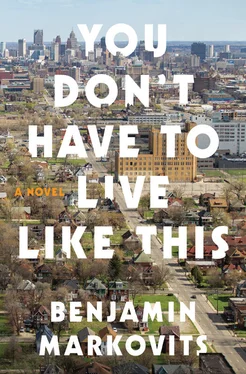But I talked to Cynthia, too — an intense woman. She said, the way they were living in New York, it’s lucky nobody died. Just to pay the mortgage she started working as a paralegal in the city three days a week. (Apart from all her other degrees she spent a year at law school.) With the commute she didn’t get home until ten o’clock some nights. There were basic things about family life, just to keep the ship running, that didn’t get done. Her kids walked out of the house without a packed lunch. When Miriam was three years old, she caught whooping cough. But you have to have the energy to pay attention to the signs, you have to be prepared to get out of bed at two a.m., and get dressed, and get the kids dressed, and drive to the hospital. You have to be sane enough to recognize what needs to be done, and what can be put off until the morning. But nobody in that house was sane. This is what she wanted from moving to Detroit — she wanted to get more pleasure from her kids, while they were young and still essentially happy animals. That’s the phrase she used.
In fact, most of us were proud of doing what we were doing, and talked about it proudly, which helped us get along. We wanted to say, here, at least, I know who my neighbors are. The Rosens moved from outside Newburgh, and there were a lot of ex-suburbanites on our block who didn’t use to know anybody they could borrow an egg from. So we borrowed a lot of eggs.
Another curious feature was the political mix. You’d expect a lot of left-wing hippies, counterculturists, and we got them, too. But there was also a libertarian streak, and a number of Tea Party types.
Opposite the Rosens lived a childless married couple called the Adlers, Tina and Don. Don was a professional grumbler who worked in insurance and was forced into early retirement a couple of years ago. First they moved to Phoenix (from Kansas City), which was too expensive he said, and not his scene. So he said to Tina, for once in our lives let’s do something with our lives. He used to have political ambitions but the system was hopeless and corrupt. The trouble with any system is that it’s designed to perpetuate itself. There’s no point in getting into government if you want to get rid of government. That’s not how it works. And so on.
He used to walk over the road when he picked up his newspaper and talk to me. He was kind of friendly-miserable. When he heard about this Detroit business, he thought, this is what I’ve been talking about my whole life. The idea of America is a small-town idea, Jamestown, Plymouth, it’s a city-state idea. In his opinion the trouble started with the Constitution. There was nothing wrong with the Articles of Confederation — a confederation is what we should have stuck with. He read history books and liked to explain why he disagreed with them. He also watched a lot of TV and sometimes told me in the morning what he planned to watch later in the day.
Tina was one of these nice women who puts up with unreasonable men. Her whole personality was a defense against male-pattern craziness and also at the same time a kind of supporting act. She was small and made herself up heavily. Her hair was supposed to look blond but looked faded; it couldn’t quite take on the artificial coloring, it had got too thin. In her own way, she was just as crazy as him. But they must have had guts, too, to move to Detroit in their sixties, when they didn’t know anybody. She said to me privately that Don was much happier these days. There were days in Phoenix he wouldn’t leave the house.
“I know he talks too much,” she said. “You’re a good listener. Don’t think I don’t thank you in my heart when I see you together. But he’s one of those men, when he isn’t talking too much it’s worse.”
But Don did more than talk. He started getting involved in the politics of the place. Robert and the rest of us hoped that something like a town hall mentality would develop, but there wasn’t anything in the charter about local government. He thought it should spring up on its own.
In fact, what happened was this. The first community organization of any kind was the Neighborhood Watch, set up by Kurt Stangel and Eddie Blyleven and a few other early arrivers. (It’s funny, but there was already a slight difference in status between the people who came in that first wave, in late February and early March, and the ones who showed up later, during the summer and after. Walter and I were considered second-wavers.) Eventually the Neighborhood Watch started concerning itself with more than just the roster for patrols. In August, there was a string of burglaries along the streets running off East Lafayette, more violent ones, involving guns. A kid, a nine-year-old boy, was briefly held hostage — forced at gunpoint into a car and then pushed out several blocks later, from where he had to make his way home in the dark. I think they just wanted to scare him, they wanted to say fuck you or watch out. He wasn’t hurt but another time somebody did get shot, a Michigan grad student named Shreedhar Patel, who was fixing up a place for his family to move into. Maybe it was the same guys who took the kid, but Shreedhar had a gun, a Beretta 92 that his father had given him when he moved to Detroit, and which he didn’t know how to work. Somebody saw it and shot him in the leg; then they took off. Eddie suggested establishing a couple of checkpoints at night, by the corners of St. Paul and Grand and Jefferson and Van Dyke, and closing off some of the smaller cross streets altogether. Part of the western border was the cemetery wall, and to the north and east the neighborhood opened out into the other new settlements.
For the first time, the meeting was widely attended. People crowded into Eddie’s front room, and since the night was fine eventually moved out into the garden. There were strong feelings and real disagreements. The mother of that nine-year-old boy stood up to say something, one of these tightly put-together, anxious hippie moms, who bike their kids to school and go shopping in big cars. “These people,” she started to say, “what you have to understand about these people,” before someone shouted over her. What do you mean, these people, why don’t you just say it, etc. You could hear us several blocks away.
Then Jayson stood up. He was short and chubby and even on his feet had to shout a little to get noticed, but when people saw his black face they let him talk. “Wait a minute, wait a minute here,” he said. “This isn’t a race thing. This is a class thing. You’ve got to understand the mentality. It’s about you just moved here and what do you know. Let’s get that straight.”
The boy’s mother said, “I will not be shamed out of saying what I want to say. If it was your boy— What you have to realize is that the first person I blame is myself.”
This went on too long in my opinion, the righteousness and upset and self-explanation, on all sides. But we got through it in the end, and afterwards there was a kind of elevated mood, like, this is politics, this is how you talk things through.
The first thing we decided is that the Neighborhood Watch Committee needed to be democratically elected, which didn’t make much immediate difference, since Kurt and Eddie got voted in by a show of hands. But Jayson also put himself forward and won a seat on the panel. So did Don Adler. And the motion was passed. We closed off St. Paul, Kercheval, Baldwin, Seminole, etc., after nine p.m., using old cars, and set up checkpoints along the rest.
ROBERT JAMES WASN’T TOO HAPPY about any of this. “You haven’t got the right,” he said, “and if something goes wrong there’ll be big trouble. And something will go wrong.”
He used to pick me up in the car on the corner of Johanna and drive us over the bridge to Belle Isle for a jog. Sometimes afterwards we came back to his place for breakfast, then I’d walk home.
Читать дальше












